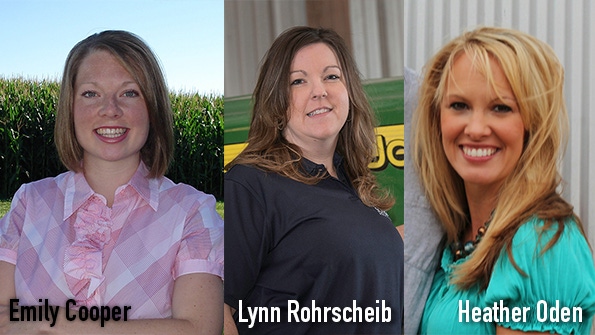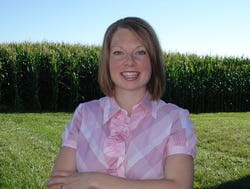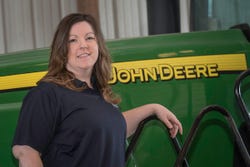
Think DifferentHeather Oden says today’s female generation can benefit from being part of what has been a predominantly male industry. “Today’s production agriculture creates opportunities for women that we did not have before. Sometimes I stand out in a meeting because I am a female. That gives me a platform to educate other farmers about my role on the farm. I can use my experience as a teacher and public speaker to show others that I am not Jon’s [her husband] secretary, I am Jon’s partner.”
May 19, 2015

If Emily Hirsch Cooper had graduated from college 15 years ago, she believes she wouldn’t have pursued the same opportunities in production agriculture that she has today. The 2011 Purdue University ag business management graduate says she likely would have taken an industry job.

Emily Cooper is excited about the future for women working in production agriculture. As a new mom, she looks forward to the doors that may open in her daughter’s future.
Instead, she saw tremendous opportunity in returning to work full-time on the family farm. Emily and her brother, Jacob Hirsch, joined their parents, Mike and Beverly, to create Pathway Family Farms in Fort Branch, Ind., in 2011. They raise corn, soybeans and wheat/double-crop soybeans on farmland that encompasses parts of Indiana, Kentucky and Illinois.
“College broadened my horizons. It made me see the diversity in production agriculture and showed me that the skill sets needed to succeed in the field are expanding,” Cooper says. “It isn’t all agronomy and mechanics, although I have experience scouting and combining. Farming is also technology, finance and strategic planning.”
Emily works in the farm office and is in charge of human resources, farm business development and marketing. She is also co-marketer for the grain, manages cost and benefit analyses for purchasing or leasing machinery and land and is a big-picture finance planner.
“For us, the sex and age diversity among our management team introduces new ways to think and new ways to see things. We capitalize on the great synergism that we can create when males and females and 20-somethings and 50-somethings are at the table,” Emily says.
It can be done
Lynn Rohrscheib from Fairmount, Ill., has a similar family setup. She and her sister, Stacey Rickard, are fourth-generation farmers. Together with their parents, Vernon and Mary Rohrscheib, they farm about 7,500 acres of corn, soybeans and wheat. Each has a 25 percent share of the farm. Lynn also helps her parents run a custom application business, C&R Ag Supply, Inc.

Lynn Rohrscheib was encouraged by her family to participate on the farm and learn. She didn’t think twice about her decision to go into production agriculture.
“I am a very versatile player on our farm,” Lynn says. She handles recordkeeping, employee insurance and paperwork, pays the bills, manages the farm’s social media, chooses varieties to plant, helps with grain marketing and works in day-to-day operations, such as working the ground, scouting fields and loading, moving and fueling equipment.
Lynn, who is thankful her farm family did not discriminate against her or her sister for being female, has a degree in plant and soil sciences from Southern Illinois University Carbondale. She also serves as a director for the Illinois Soybean Association.
“I made this my career because I wanted to help make things smoother on my family and take some of the stress of running a farm off of them,” she says. “I get huge satisfaction knowing what I do helps feed and clothe the world. I love farming.”
Lynn’s grandmother, her role model, also farmed. “She did everything. She was determined that if a man could do it, so could she. She was bound to the land and felt more at home in the field than in a kitchen,” she says.
Lynn’s motto, “It can be done,” was shared with her years ago; she uses it daily to guide her professional life.
“Being a female leader in the agriculture industry is something I don’t take lightly,” she says. “I work to improve farming conditions for everyone – whether to lessen governmental regulations, implement new money-saving technologies, improve the land as a good steward or ensure that farming and agriculture will still be around for the next generation.
“I want to show other young women that it can be done.”
Breaking through old stereotypes
Heather Oden agrees. She’s familiar with the common misperception of a male farmer who wears bib overalls and keeps a bit of straw in his teeth.
“That could not be farther from the truth in today’s production agriculture,” she says. “My role in production agriculture may be nontraditional, but today it is also a necessity.”
Heather Oden is in charge of employee management, landowner and public relations, human resources, accounting, safety and regulatory compliance, business development and office management.
Heather, who owns Sterling Heritage Farms with her husband, Jon, near Sterling, Kan., is in charge of employee management, landowner and public relations, human resources, accounting, safety and regulatory compliance, business development and office management.
Sterling Heritage Farms is mainly a crop and cattle operation that grows wheat, corn, milo, soybeans and alfalfa. The farm has six full-time and two part-time employees and hires seasonal help. Heather screens applicants and does the hiring.
“When we first started in the business, I just did the books like Jon’s mom had done,” she says.
As fifth-generation producers, Heather and Jon have deep agricultural roots. They began farming with Jon’s parents in 1994, when Heather was teaching second grade. When Jon assumed management of Oden Land and Livestock in 1998, Heather resigned her teaching position to raise their family and help on the operation full time. In 2012, Oden Land and Livestock became Sterling Heritage Farms.
“We have had to learn a good communication system. We differentiate our roles but still collaborate,” Heather says. “We work the land, but we also have to do strategic planning and manage landowner relationships. Operations that survive today are those that further their business and finance skills and take a team approach.”
Along with being pleasantly surprised that her skills in public speaking, education and marketing would be so useful in production agriculture, Heather also appreciates the increased flexibility and control of her day. She is more than happy to be an integral part of decisions about the direction of the farm.
Changing industry opens doors
Heather believes that everything will fall into place for farmers who work hard and are honest, genuine and determined to succeed, regardless of gender.
“There is nothing better than working with your family every day. It can be challenging at times, but there is great pride in seeing multiple generations being able to do things they love together,” she says. “I have found that if you are respectful, you will gain the respect of others. Write down goals so you have something to work toward, and keep yourself accountable for advancing future objectives for your farm and for the industry.”
Emily Cooper is likewise driven. “Once you earn their respect, then being female is no longer a barrier,” she says. “And if you have a positive mindset, you can turn around and stand out because you are female.”
Heather Oden advises other females to think outside the box when advancing their contributions. “There are a variety of roles to use specialized gifts, and production ag is the fastest-changing industry on the planet,” she says. “There is a place for women in ag with the passion, drive and skills they want to use.”
Emily is especially excited about the future for women in production agriculture. She is confident that rapid changes will continue to open more doors for females, including her own daughter.
“I am excited to give her opportunities in agriculture, even though her agriculture will likely be different than the agriculture I work in today,” she says. “My advice to all females in agriculture is to let your light shine. Don’t conform. Capitalize on the perspective you bring to the table and be sure if you fail, it is not from a lack of trying. Success will follow when you use your skill set and work with great people.”
Female farmers by the numbers: Census 2012
The latest U.S. agriculture census shows that women had varied roles in production agriculture in 2012:
Nearly 970,000 female farmers worked in the United States.
Women controlled seven percent of U.S. farmland and accounted for three percent of sales.
Thirty percent of farmers were women, who comprised larger percentages in the Northeast, Southwest and West.
Of total female farmers, 288,264 were principal operators.
Women principal operators sold $12.9 billion in agricultural products, including $6 billion in crops and $6.9 billion in livestock. They managed 62.7 million acres.
Eighty-two percent of farms with a woman principal operator had fewer than 180 acres, and 76 percent had sales of less than $10,000.
About one-fourth of women farmers specialized in combination crop farming. The next largest categories were beef cattle and combination livestock farming.
About the Author(s)
You May Also Like



